class: center, middle, inverse, title-slide .title[ # simChef culinary school 🍳 ] .subtitle[ ## Cooking up reliable simulations in R ] .author[ ### James Duncan, Tiffany Tang ] .institute[ ### <p>UC Berkeley</p> ] .date[ ### 2023/03/06 ] --- class: hide_logo <style>.xe__progress-bar__container { top:0; opacity: 1; position:absolute; right:0; left: 0; } .xe__progress-bar { height: 0.25em; background-color: #fbb040; width: calc(var(--slide-current) / var(--slide-total) * 100%); } .remark-visible .xe__progress-bar { animation: xe__progress-bar__wipe 200ms forwards; animation-timing-function: cubic-bezier(.86,0,.07,1); } @keyframes xe__progress-bar__wipe { 0% { width: calc(var(--slide-previous) / var(--slide-total) * 100%); } 100% { width: calc(var(--slide-current) / var(--slide-total) * 100%); } }</style> <div> <style type="text/css">.xaringan-extra-logo { width: 110px; height: 128px; z-index: 0; background-image: url(images/simChef-hex-v2.png); background-size: contain; background-repeat: no-repeat; position: absolute; top:1em;right:1em; } </style> <script>(function () { let tries = 0 function addLogo () { if (typeof slideshow === 'undefined') { tries += 1 if (tries < 10) { setTimeout(addLogo, 100) } } else { document.querySelectorAll('.remark-slide-content:not(.title-slide):not(.inverse):not(.hide_logo)') .forEach(function (slide) { const logo = document.createElement('div') logo.classList = 'xaringan-extra-logo' logo.href = null slide.appendChild(logo) }) } } document.addEventListener('DOMContentLoaded', addLogo) })()</script> </div> .center.hex-logo[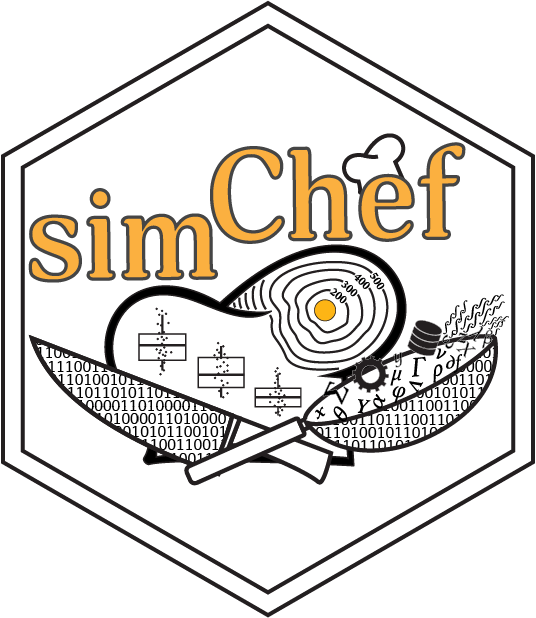] .center[ ```r devtools::install_github("Yu-Group/simChef") ``` ] .center.faces[ .fl.w-20[<img src="images/james.jpg" alt="James Duncan" class="center">] .fl.w-20[<img src="images/Tiffany.jpg" alt="Tiffany Tang" class="center">] .fl.w-20[<img src="images/corrine.jpg" alt="Corrine F. Elliott" class="center">] .fl.w-20[<img src="images/phil.jpg" alt="Philippe Boileau" class="center">] .fl.w-20[<img src="images/Bin.jpg" alt="Bin Yu" class="center">] ] .center.faces[ .fl.w-20.f6[J. Duncan] .fl.w-20.f6[T. Tang] .fl.w-20.f6[C.F. Elliott] .fl.w-20.f6[P. Boileau] .fl.w-20.f6[B. Yu] ]<br /> --- # Today's recipe ### 1. Overview (~5-10 min) -- class: no-animation - Why we created `simChef` -- - Core abstractions in `R6` -- ### 2. Dive into `simChef`'s features (~30-40 min) -- - Tidyverse-like "grammar of simulations" -- - Inputs and outputs of your functions -- - Building the components of a `simChef::Experiment` -- - Running and debugging -- - Summarizing and documenting your simulation -- ### 3. Q&A (~5-10 min) --- # Overview `simChef` is an R package to facilitate **transparent** and **reliable** simulation experiments, with PCS as the guiding framework. .center.recipe1[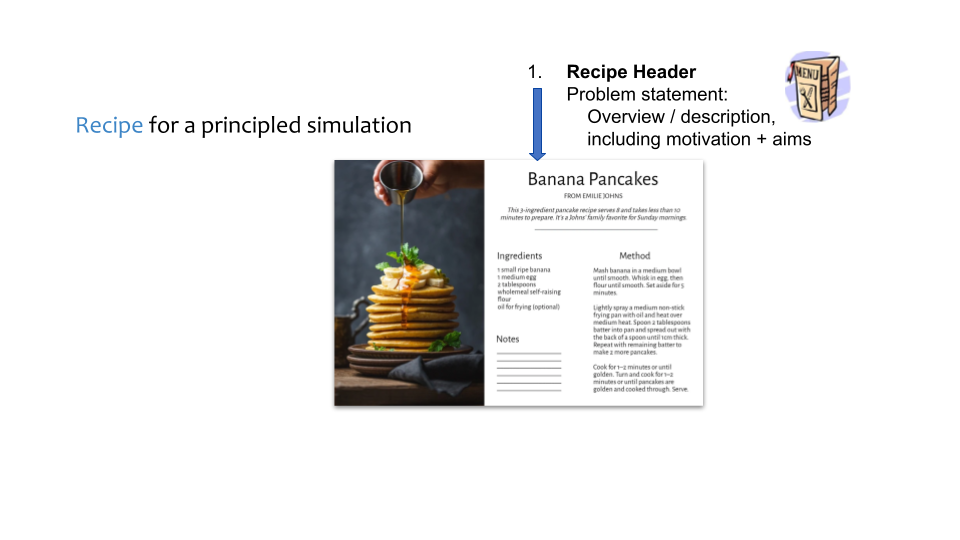] --- # Overview `simChef` is an R package to facilitate **transparent** and **reliable** simulation experiments, with PCS as the guiding framework. .center.recipe2[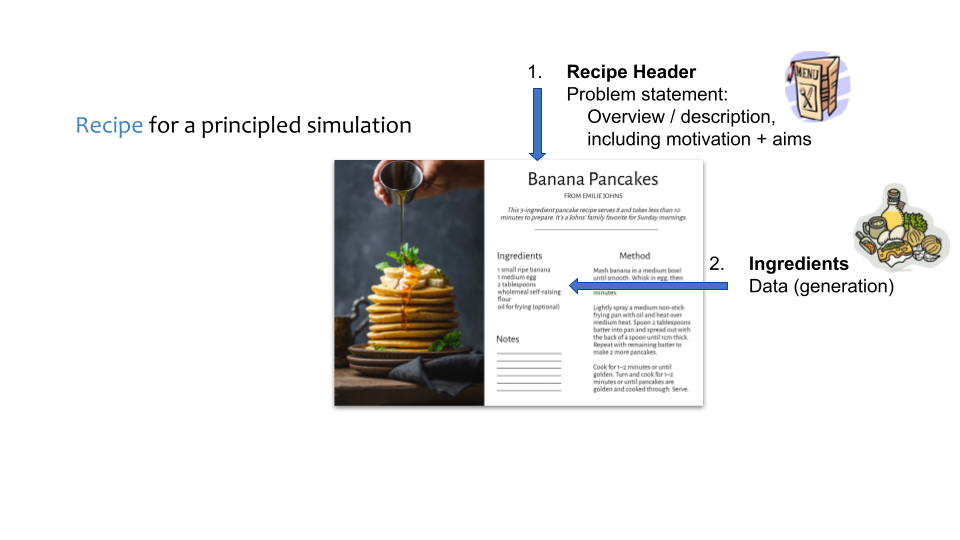] --- # Overview `simChef` is an R package to facilitate **transparent** and **reliable** simulation experiments, with PCS as the guiding framework. .center.recipe3[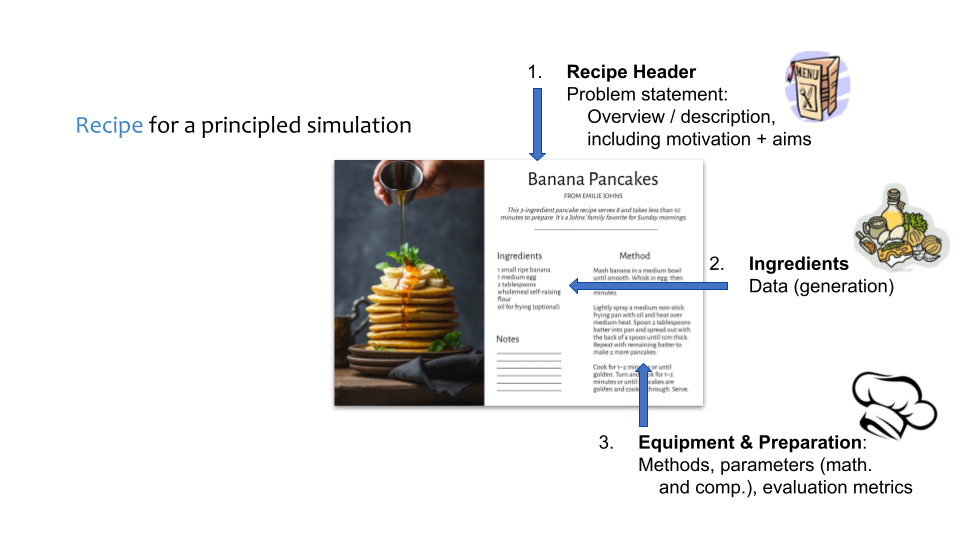] --- # Overview `simChef` is an R package to facilitate **transparent** and **reliable** simulation experiments, with PCS as the guiding framework. .center.recipe4[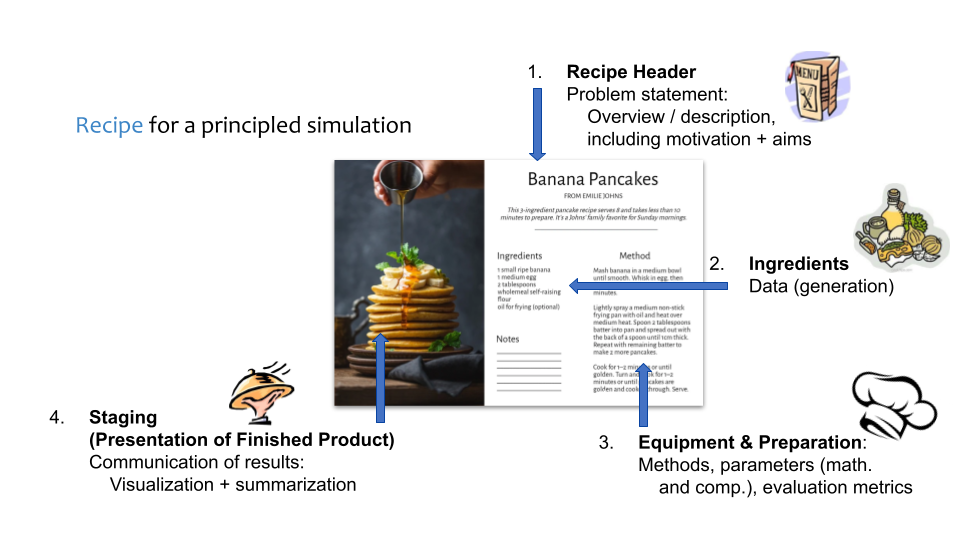] --- # A simulation with MERITS <span style="font-size: 32pt; font-family: bold">**M**</span>**odular**: written in **self-contained** and **logically partitioned** segments of code. -- <span style="font-size: 32pt; font-family: bold">**E**</span>**fficient**: **computationally** and **conceptually** streamlined. -- <span style="font-size: 32pt; font-family: bold">**R**</span>**ealistic**: **faithful** to the **natural world** or **realm of application**, to the best extent allowed by established theory and/or available real-world data. -- <span style="font-size: 32pt; font-family: bold">**I**</span>**ntuitive**: **sensible** to both the intended audience and a **broad range** of potential consumers, across all parts of the research product: simulation architecture, documentation, code, and analysis of results. -- <span style="font-size: 32pt; font-family: bold">**T**</span>**ransparent**: documented **thoroughly** and **candidly**. -- <span style="font-size: 32pt; font-family: bold">**S**</span>**table**: **reproducible/replicable**, and (potentially) **generalizable** beyond the scope of the simulation. --- class: more-list-spacing # The `simChef` Vision - Versatile **R framework** to support simulation studies satisfying these MERITS -- - Allow data scientists to focus on substantive questions with **fewer technical distractions** -- - **Lower** the **activation barrier** to running high-quality simulation studies -- - Provide comprehensive simulation **documentation and archive** of simulation artifacts for **transparency and reproducibility** --- class: more-list-spacing # `simChef` Highlights - An **intuitive grammar** for simulation studies -- - Automated **documentation** and **visualization** of results -- - **Caching** of results -- - Ease of **parallelization** -- - **Debugging** tools --- # An intuitive grammar for simulation studies ```r # create experiment my_exper <- create_experiment(name = "Experiment") %>% add_dgp(my_dgp, name = "DGP1") %>% add_method(my_method, name = "Method1") %>% add_evaluator(my_evaluator, name = "Eval1") %>% add_visualizer(my_visualizer, name = "Viz1") %>% add_vary_across(.dgp = "DGP1", n = c(10, 100, 1000)) # run experiment my_results <- run_experiment(my_exper, n_reps = 25) # document and visualize experiment results create_doc_template(my_exper) render_docs(my_exper) ``` --- # Core abstractions We use [`R6`](https://r6.r-lib.org/index.html) to encompass these simulation components: -- **`simChef::DGP`** .inset.ml3[Data-generating processes which define the “ground truth” and flexibly generate simulated data.] -- **`simChef::Method`** .inset.ml3[The main objects of study (your method), along with competitors / baselines.] -- **`simChef::Evaluator`** .inset.ml3[Produce meaningful summaries of the results.] -- **`simChef::Visualizer`** .inset.ml3[Output plots, tables, R Markdown, LaTeX, etc. to populate interactive experiment documentation.] -- **`simChef::Experiment`** .inset.ml3[Puts together all of the above.] --- # A grammar of data ```r library(simChef) set.seed(123) my_dgp <- DGP$new(function(n) rnorm(n), "my-dgp") ``` --- count: false # A grammar of data ```r library(simChef) set.seed(123) my_dgp <- create_dgp(function(n) rnorm(n), "my-dgp") ``` --- count: false # A grammar of data ```r library(simChef) set.seed(123) my_dgp <- create_dgp(function(n) rnorm(n), "my-dgp") my_data <- my_dgp$generate(3) str(my_data) ``` ``` ## List of 1 ## $ : num [1:3] -0.56 -0.23 1.56 ``` --- count: false # A grammar of methods ```r library(simChef) set.seed(123) my_dgp <- create_dgp(function(n) rnorm(n), "my-dgp") my_data <- my_dgp$generate(3) str(my_data) ``` ``` ## List of 1 ## $ : num [1:3] -0.56 -0.23 1.56 ``` ```r my_method <- create_method( # or Method$new(...) function(x) mean(x), "my-method" ) ``` --- count: false # A grammar of methods ```r library(simChef) set.seed(123) my_dgp <- create_dgp(function(n) rnorm(n), "my-dgp") my_data <- my_dgp$generate(3) str(my_data) ``` ``` ## List of 1 ## $ : num [1:3] -0.56 -0.23 1.56 ``` ```r my_method <- create_method( # or Method$new(...) function(x) mean(x), "my-method") my_results <- my_method$fit(my_data) my_results ``` ``` ## # A tibble: 1 × 1 ## result1 ## <dbl> ## 1 0.256 ``` --- # A grammar of replicates ```r my_exper <- create_experiment( # or Experiment$new(...) name = "my-exper" ) ``` --- # A grammar of replicates ```r my_exper <- create_experiment(name = "my-exper") ``` --- count: false # A grammar of replicates ```r my_exper <- create_experiment(name = "my-exper") %>% add_dgp(my_dgp) ``` --- count: false # A grammar of replicates ```r my_exper <- create_experiment(name = "my-exper") %>% add_dgp(my_dgp) %>% add_method(my_method) ``` --- count: false # A grammar of replicates ```r my_exper <- create_experiment(name = "my-exper") %>% add_dgp(my_dgp) %>% add_method(my_method) %>% add_vary_across(.dgp = my_dgp, n = c(10, 100, 1000)) ``` --- count: false # A grammar of replicates ```r my_exper <- create_experiment(name = "my-exper") %>% add_dgp(my_dgp) %>% add_method(my_method) %>% add_vary_across(.dgp = my_dgp, n = c(10, 100, 1000)) my_exper ``` ``` ## Experiment Name: my-exper ## Saved results at: results/my-exper ## DGPs: my-dgp ## Methods: my-method ## Evaluators: ## Visualizers: ## Vary Across: ## DGP: my-dgp ## n: num [1:3] 10 100 1000 ``` --- count: false # A grammar of replicates ```r my_exper <- create_experiment(name = "my-exper") %>% add_dgp(my_dgp) %>% add_method(my_method) %>% add_vary_across(.dgp = my_dgp, n = c(10, 100, 1000)) my_results <- fit_experiment( # or my_exper$fit(...) my_exper, n_reps = 25 ) ``` --- count: false # A grammar of replicates ```r my_exper <- create_experiment(name = "my-exper") %>% add_dgp(my_dgp) %>% add_method(my_method) %>% add_vary_across(.dgp = my_dgp, n = c(10, 100, 1000)) my_results <- fit_experiment( # or my_exper$fit(...) my_exper, n_reps = 25 ) ``` ``` ## Fitting my-exper... ``` ``` ## 25 reps completed (totals: 25/25) | time taken: 0.135532 minutes ``` ``` ## ============================== ``` ```r my_results ``` ``` ## # A tibble: 75 × 5 ## .rep .dgp_name .method_name n result1 ## <chr> <chr> <chr> <dbl> <dbl> ## 1 1 my-dgp my-method 10 -0.392 ## 2 1 my-dgp my-method 100 -0.0204 ## 3 1 my-dgp my-method 1000 -0.0568 ## 4 2 my-dgp my-method 10 0.259 ## 5 2 my-dgp my-method 100 0.0202 ## 6 2 my-dgp my-method 1000 0.0581 ## 7 3 my-dgp my-method 10 -0.0403 ## 8 3 my-dgp my-method 100 -0.205 ## 9 3 my-dgp my-method 1000 -0.101 ## 10 4 my-dgp my-method 10 -0.514 ## # … with 65 more rows ``` --- # A grammar of simulations ```r # user's function must have a `fit_results` arg # can also take a `vary_params` arg and additional custom args my_eval <- create_evaluator(...) ``` --- count: false # A grammar of simulations ```r # user's function must have a `fit_results` arg # can also take a `vary_params` arg and additional custom args my_eval <- create_evaluator(...) # user's function should have either a `fit_results` or `eval_results` arg # can also take a `vary_params` arg and additional custom args my_viz <- create_vizualizer(...) ``` --- count: false # A grammar of simulations ```r # user's function must have a `fit_results` arg # can also take a `vary_params` arg and additional custom args my_eval <- create_evaluator(...) # user's function should have either a `fit_results` or `eval_results` arg # can also take a `vary_params` arg and additional custom args my_viz <- create_vizualizer(...) my_exper %>% add_evaluator(my_eval, "my-eval") %>% add_visualizer(my_viz, "my-viz") ``` --- count: false # A grammar of simulations ```r # user's function must have a `fit_results` arg # can also take a `vary_params` arg and additional custom args my_eval <- create_evaluator(...) # user's function should have either a `fit_results` or `eval_results` arg # can also take a `vary_params` arg and additional custom args my_viz <- create_vizualizer(...) my_exper %>% add_evaluator(my_eval, "my-eval") %>% add_visualizer(my_viz, "my-viz") run_experiment(my_exper) # reps + eval + viz ``` --- # Running and debugging You can find a similar example at https://yu-group.github.io/simChef/articles/parallel.html Required packages: `simChef`, `glmnet`, `MASS`. -- Some slightly more interesting `DGP` functions: ```r dense_dgp_fun <- function(n=100, rho=0.5, noise_level=1) { cov_mat <- diag(nrow = 5) cov_mat[cov_mat == 0] <- rho X <- MASS::mvrnorm(n = n, mu = rep(0, 5), Sigma = cov_mat) y <- cbind(1, X) %*% c(-8, 3, -1, 0.1, 0.5, 1) + rnorm(n, sd = noise_level) return(list(X = X, y = y, coeff = c(3, -1, 0.1, 0.5, 1))) } ``` -- ```r sparse_dgp_fun <- function(n=100, d=100, rho=0.5, sparsity=0.5, noise_level=1, nonzero_coeff = c(-3, -1, 1, 3)) { cov_mat <- diag(nrow = d) cov_mat[cov_mat == 0] <- rho X <- MASS::mvrnorm(n = n, mu = rep(0, d), Sigma = cov_mat) coeff_prob <- c(sparsity, rep((1 - sparsity) / 4, times = 4)) coeff <- c( -8, # intercept sample( c(0, nonzero_coeff), size = d, replace = TRUE, prob = coeff_prob ) ) y <- cbind(1, X) %*% coeff + rnorm(n, sd = noise_level) return(list(X = X, y = y, coeff = coeff[-1])) } ``` --- # Running and debugging Some slightly more interesting `Method` functions: ```r ols <- function(X, y, ...) { fit <- lm(y ~ X) return(c(list(fit = fit), list(...))) } elnet <- function(X, y, alpha=1, lambda=0.1, ...) { fit <- glmnet::glmnet( x = X, y = y, family = "gaussian", alpha = alpha, lambda=lambda ) if (alpha == 0.1) { stop("uh oh!") } return(c(list(fit = fit), list(...))) } ``` --- # Running and debugging ```r dense_dgp <- create_dgp(dense_dgp_fun) sparse_dgp <- create_dgp(sparse_dgp_fun) ols_method <- create_method(ols) elnet_method <- create_method(elnet) ``` -- ```r experiment <- create_experiment( name = "exper", future.packages = "dplyr" ) %>% add_dgp(dense_dgp, "dense") %>% add_dgp(sparse_dgp, "sparse") %>% add_method(ols_method, "ols") %>% add_method(elnet_method, "elnet") %>% add_vary_across( .dgp = "sparse", n = c(100, 500, 1000), nonzero_coeff = list(c(-3, -1, 1, 3), c(-0.3, -0.1, 0.1, 0.3)) ) %>% add_vary_across( .method = "elnet", alpha = c(0, 0.25, 0.5, 0.75, 1) ) experiment ``` ``` ## Experiment Name: exper ## Saved results at: results/exper ## DGPs: dense, sparse ## Methods: ols, elnet ## Evaluators: ## Visualizers: ## Vary Across: ## DGP: sparse ## n: num [1:3] 100 500 1000 ## nonzero_coeff: List of 2 ## $ : num [1:4] -3 -1 1 3 ## $ : num [1:4] -0.3 -0.1 0.1 0.3 ## Method: elnet ## alpha: num [1:5] 0 0.25 0.5 0.75 1 ``` --- # Running and debugging ```r n_cores <- future::availableCores(methods = "system") n_cores ``` ``` ## system ## 16 ``` ```r # run in parallel future::plan(future::multisession, workers = n_cores - 1) results <- run_experiment(experiment, n_reps = 3) ``` ``` ## Fitting exper... ``` ``` ## 3 reps completed (totals: 3/3) | time taken: 0.202136 minutes ``` ``` ## ============================== ``` ``` ## No evaluators to evaluate. Skipping evaluation. ``` ``` ## ============================== ``` ``` ## No visualizers to visualize. Skipping visualization. ``` ``` ## ============================== ``` ```r results ``` ``` ## $fit_results ## # A tibble: 126 × 8 ## .rep .dgp_name .method_name n nonzero_coeff alpha fit coeff ## <chr> <chr> <chr> <dbl> <list> <dbl> <list> <list> ## 1 1 dense elnet NA <NULL> 0 <elnet> <dbl [5]> ## 2 1 dense elnet NA <NULL> 0.25 <elnet> <dbl [5]> ## 3 1 dense elnet NA <NULL> 0.5 <elnet> <dbl [5]> ## 4 1 dense elnet NA <NULL> 0.75 <elnet> <dbl [5]> ## 5 1 dense elnet NA <NULL> 1 <elnet> <dbl [5]> ## 6 1 dense ols NA <NULL> NA <lm> <dbl [5]> ## 7 1 sparse elnet 100 <dbl [4]> 0 <elnet> <dbl [100]> ## 8 1 sparse elnet 100 <dbl [4]> 0.25 <elnet> <dbl [100]> ## 9 1 sparse elnet 100 <dbl [4]> 0.5 <elnet> <dbl [100]> ## 10 1 sparse elnet 100 <dbl [4]> 0.75 <elnet> <dbl [100]> ## # … with 116 more rows ## ## $eval_results ## NULL ## ## $viz_results ## NULL ``` --- # Running and debugging ```r experiment %>% update_vary_across(.method = "elnet", alpha = 0.1) ``` -- ```r results <- run_experiment(experiment, n_reps = 3) ``` ``` ## Fitting exper... ``` ``` ## Error in `self$fit()`: ## ! Error(s) encountered while running the simulation, including: ## ## uh oh! ## The above error occurred while processing "elnet" with the following params: ## $ alpha : num 0.1 ## $ data_list:List of 3 ## ..$ X : num [1:100, 1:5] 0.131 1.686 0.325 1.628 -1.053 ... ## .. ..- attr(*, "dimnames")=List of 2 ## ..$ y : num [1:100, 1] -7.7786 0.0333 -6.9508 -3.6844 -12.2912 ... ## ..$ coeff: num [1:5] 3 -1 0.1 0.5 1 ## $ .simplify: logi FALSE ## ## Use `rlang::last_error()$partial_results`to return partial simulation results and `rlang::last_error()$errors` to get simulation errors with the `DGP`, `Method`, and params that led to the error. ``` -- ```r rlang::last_error()$partial_results ``` ``` ## # A tibble: 3 × 5 ## .rep .dgp_name .method_name fit coeff ## <chr> <chr> <chr> <list> <list> ## 1 1 dense ols <lm> <dbl [5]> ## 2 2 dense ols <lm> <dbl [5]> ## 3 3 dense ols <lm> <dbl [5]> ``` ```r rlang::last_error()$errors ``` ``` ## # A tibble: 3 × 9 ## .dgp .dgp_…¹ .dgp_…² .method .meth…³ .method_pa…⁴ .err .pid .gc ## <lis> <chr> <lgl> <list> <chr> <list> <list> <int> <list> ## 1 <DGP> dense NA <Method> elnet <named list> <smChf_rr> 197957 <dbl[…]> ## 2 <DGP> dense NA <Method> elnet <named list> <smChf_rr> 197951 <dbl[…]> ## 3 <DGP> dense NA <Method> elnet <named list> <smChf_rr> 197946 <dbl[…]> ## # … with abbreviated variable names ¹.dgp_name, ².dgp_params, ³.method_name, ## # ⁴.method_params ``` --- # Automated R Markdown Documentation **Rapid** and **convenient** reporting of *results* **Transparent** and **organized** communication of the *simulation design + code* -- One line of code: ```r render_docs(my_expr) ``` -- 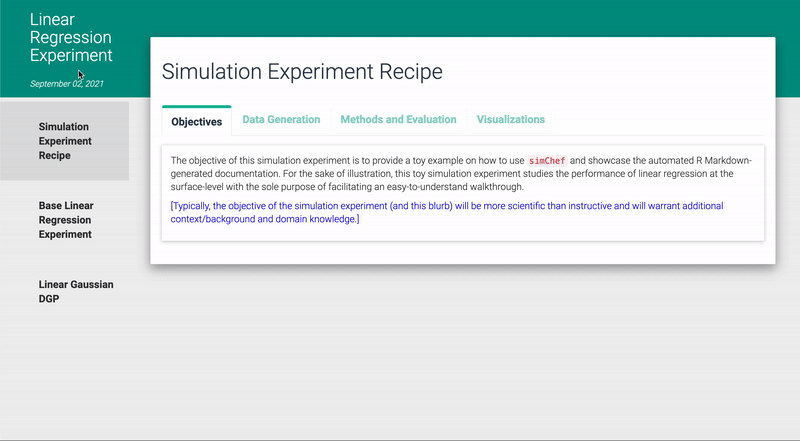 -- Let's take a look at an the output of an example simulation project: [github.com/PhilBoileau/simChef-case-study](https://github.com/PhilBoileau/simChef-case-study) --- class: no-padding <iframe src="ex/empirical-fdr-comparison.html" width=100% height=100%></iframe> --- class: hide_logo # `dgpoix` 🥕 ### A reusable library of DGPs [github.com/Yu-Group/dgpoix](https://github.com/Yu-Group/dgpoix) ("*dee-gee-pwaa*", rhymes with "mirepoix") -- DGPs are the key **ingredients** of every simulation. -- `dgpoix` allows us to quickly create interesting DGPs from modular components. -- ```r linear_gaussian_dgp <- simChef::create_dgp( dgpoix::linear_gaussian_dgp, # params for linear_gaussian_dgp: n = 100, p_obs = 3, intercept = 1, err = rnorm # dgpoix::coef_sampler function and its params: betas = dgpoix::coef_sampler, coefs = c(0, 0.5, 1), probs = c(0.5, 0.3, 0.2) ) ``` -- ```r custom_dgp <- simChef::create_dgp( dgpoix::xy_dgp_constructor, # params for linear_gaussian_dgp: X_fun = my_custom_X_fun, y_fun = my_custom_y_fun, err_fun = my_custom_err_fun, .X_p = 20, # args specific to X .y_p = 2, # err_fun args have no overlap with X_fun or y_fun n_blocks = 3, rho = c(0, 0.4, 0.8) ) ``` -- `dgpoix` is currently in very early development, so expect the API to change. --- exclude: true # DGPs --- exclude: true # DGPs This function is then passed to `simChef` to create a `DGP` (with optional default values for `n` and `p`). ```r my_linear_gaussian_dgp_fun <- function(n, p) { ... } dgp <- create_dgp( my_linear_gaussian_dgp_fun, n = 100, p = 3 ) simChef::list_to_tibble_row( dgp$generate() ) ## # A tibble: 1 × 3 X y betas <list> <list> <list> 1 <dbl [100 × 3]> <dbl [100 × 1]> <dbl [3]> ``` --- exclude: true # Varying across DGP / method parameters After adding DGPs and methods, we can set out experiment to vary across multiple parameter values. ```r elnet <- create_method( function(X, y, alpha=1) { fit <- glmnet::glmnet( x = X, y = y, family = "gaussian", alpha = alpha ) %>% broom::tidy() return(fit) } ) experiment <- create_experiment() %>% add_dgp(linear_gaussian_dgp) %>% add_method(elnet) %>% add_vary_across( linear_gaussian_dgp, p_obs = c(10, 100), # observed covariates p_unobs = c(2, 20), # unobserved covariates # varying over a vector-valued parameter 'probs': probs = list(c(0.5, 0.3, 0.2), c(0.8, 0.1, 0.1)) ) ``` --- exclude: true # Run the experiment We can run the experiment in parallel by setting a 🖇[`future`](https://future.futureverse.org/) plan before calling `fit_experiment`. ```r future::plan(future::multicore) results <- fit_experiment(experiment, n_reps = 100) ## Fitting experiment... ``` --- # Roadmap of ongoing and future work -- - Ongoing usability improvements for `simChef` -- - Integration with `testthat` for unit testing of custom simulation functions. -- - More flexible and nested parallelism, e.g.: ```r future::plan(future.batchtools::batchtools_slurm, future::multisession) run_experiment(my_exper, parallel_strategy = c("dgps", "reps")) ``` -- - Much more work on `dgpoix` -- - Your requests? [github.com/Yu-Group/simChef/issues](https://github.com/Yu-Group/simChef/issues) --- # Try it for yourself! .center[ Realistic, reliable, reproducible, and responsible simulations. ] Repo: [github.com/Yu-Group/simChef](https://github.com/Yu-Group/simChef) Docs: [yu-group.github.io/simChef](https://yu-group.github.io/simChef/index.html) Ex. simulation repo: [github.com/PhilBoileau/simChef-case-study](https://github.com/PhilBoileau/simChef-case-study) Ex. simulation docs: [https://tinyurl.com/f4ctrw7p](https://philboileau.github.io/simChef-case-study/results/empirical-fdr-comparison/empirical-fdr-comparison.html) <h2 style="text-align: center;">Let us know what you think!</h2> *For development of your own Rmd-generated html documents (and nice Rmd and ggplot themes), check out: [github.com/Yu-Group/vthemes](https://github.com/Yu-Group/vthemes) --- class: hide_logo # How these slides were made We created these slides in `Rmarkdown` via the package 🖇[`xaringan`](https://bookdown.org/yihui/rmarkdown/xaringan.html). -- These extensions make `xaringan` even more powerful: * 🖇[xaringanthemer](https://pkg.garrickadenbuie.com/xaringanthemer) * 🖇[xaringanExtra](https://pkg.garrickadenbuie.com/xaringanExtra) --